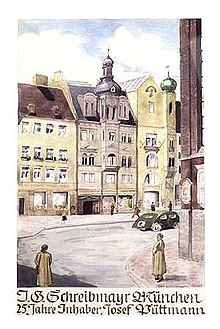Schreibmayr
| JG Schreibmayr
|
|
|---|---|
| legal form | GmbH |
| founding | October 10, 1820 |
| Seat | Munich |
| management | Andreas Püttmann |
| Number of employees | 8th |
| sales | 3.24 million € (2011) |
| Branch | Church supplies |
| Website | Schreibmayr.de |
The JG Schreibmayr GmbH is a Munich specialty shop for Church supplies.
history
On October 10, 1820, Johann Georg Schreibmayr acquired the specialty commercial justice from Johann Georg Angerer in Munich Weinstrasse 7 for CHF 1,500. While Angerer was still selling all kinds of specialties and cloth , Schreibmayr specialized in church fabrics and embroidery . He made flags and paraments . This enabled Johann Georg Schreibmayr to expand his business into the most important of its kind in Munich.
In 1851, for reasons of age, he sold his son-in-law Johann Michael Gerdeisen, who was already in the middle of the business, for CHF 5,000. Together with a partner, he opened a branch at Filserstraße 1. The high quality of the products is demonstrated by some notable awards of the time.
- 1854 Prize medal at the general German exhibition in Munich
- 1873 Royal Ludwig Medal for Industry at the Vienna World Exhibition
- 1876 First Class Medal at the Munich Arts and Crafts Exhibition
In 1927 the J. G. Schreibmayr company was sold to the sisters Franziska, Elisabeth and Anna Maria Silberbauer, who left the management of the business to the employee Charlotte Schwägerl, who had already learned from J. M. Gerdeisen. She continued to run the shop when Josef Püttmann from Speyer bought the shop in 1930.
Püttmann, who had a large parament and flag embroidery in Speyer, also acquired the Wefers company in Cologne , which was active in the same branch. Under his leadership, the range was expanded to include all church supplies. During this time the company became purveyor to the court sr. Holiness Pius XI
In 1944 the business was completely destroyed, Charlotte Schwägerl resold her private apartment. In 1948, a suitable shop was finally reopened on Frauenplatz.
After the death of Josef Püttmann in 1957, son Bernhard took over the management. In 1958, the new business owner founded a company for the manufacture of church equipment in Munich. There was a lack of young people for this very special work, so that Bernhard Püttmann decided to relocate this branch of business to Passau . About 50 people were employed there. 1960 on the occasion of the Eucharistic World Congress in Munich with Pope Johannes XXIII. , the company received the order to produce 1500 congress ciborias. The decisive factor for this was the design of a ciborium with a rotatable plexiglass segment cover that protected the hosts from wind and weather. On April 1, 1974, Püttmann sold the production facilities in Passau to the workshop manager Thomas Keim.
Schreibmayr today
In 1985, Andreas Püttmann joined the company management in the third generation of the family.
The Schreibmayr company is one of the market leaders in the industry today. Every year 60,000 catalogs are sent out in Germany, Austria and Switzerland. Products have been sold online since 1995. There is a collaboration with well-known artists of sacred art. In addition to church supplies , paraments and church fabrics , the range also includes religious art , carvings and devotional objects .
In 2005, on the occasion of World Youth Day in Cologne, Cardinal Meisner commissioned 700 mitres for bishops from all over the world. In collaboration with the church painter Eberhard Münch , the cycle "Paramentik im Wandel" is created as a contemporary collection of liturgical vestments. In 2006, Schreibmayr received the order to make the green vestments and dalmatics for Pope Benedict XVI's visit . on September 10, 2006 in Munich. On September 11, 2006, Cardinal Friedrich Wetter presented the "Patrona Bavaria" stole in the private rooms of the Archbishop's Palace as a gift on behalf of the Archdiocese of Munich and Freising .
- Known orders
Cardinal Lehmann with a white chasuble
Visit of Pope Benedict : 70 vestments made for bishops and 50 dalmatics for deacons
market
Customers include dioceses with their episcopal churches, parishes, seminaries, monasteries and devout Christians. Due to the decreasing number of Catholics, the decline in church attendance and the decrease in the number of priests, more and more parishes are being amalgamated and administered today. The costs for the administration and maintenance of the parishes are reduced to the bare minimum.
range
- Paraments - a comprehensive term for ecclesiastical textiles such as chasuble, dalmatic , alb , stole , gown , fabrics and altar boys' clothing .
- Sacred implements - chalice and host bowl, ciborium, monstrance and other vasa sacra.
- Church furniture - altar , ambo , sediles , hymn book carriages, church furnishings.
- Devotional items - articles for Christian art: icons, crosses, angels, rosaries, figures of saints and other religious home decorations.
Trade fairs and exhibitions
There are two trade fairs in the area of church equipment and organization. The Ecclesia in Cologne. It takes place every year in February. The Gloria trade fair in Dornbirn on Lake Constance in Austria, to which visitors from Switzerland and Germany also travel. Numerous vendors and suppliers of churches show their product range. In addition to mass wine, hosts, church organs, church heating, alarm systems, wood carvings, electronic song boards, sacred devices, vestments and devotional objects are also offered.
Web links
Coordinates: 48 ° 7 '22.4 " N , 11 ° 32' 54.1" E






